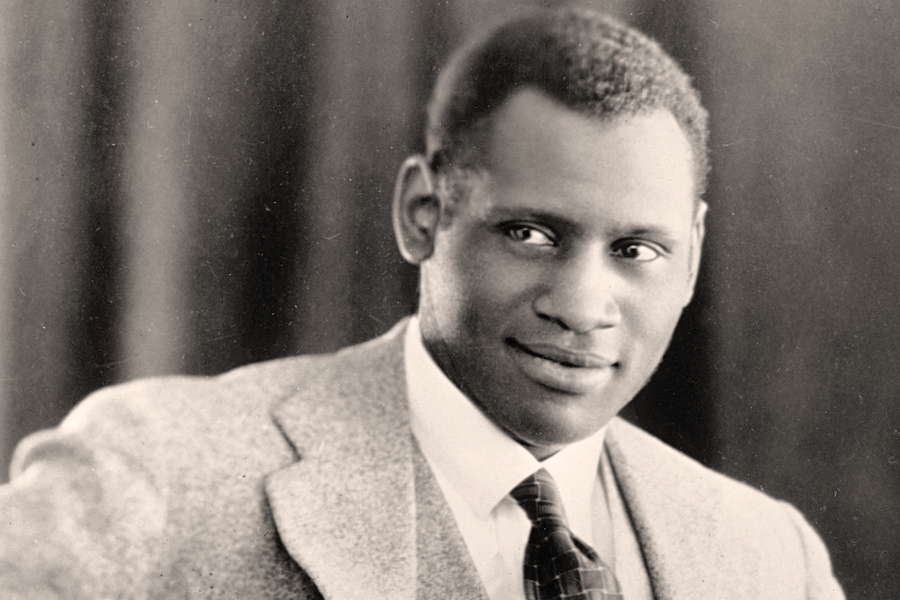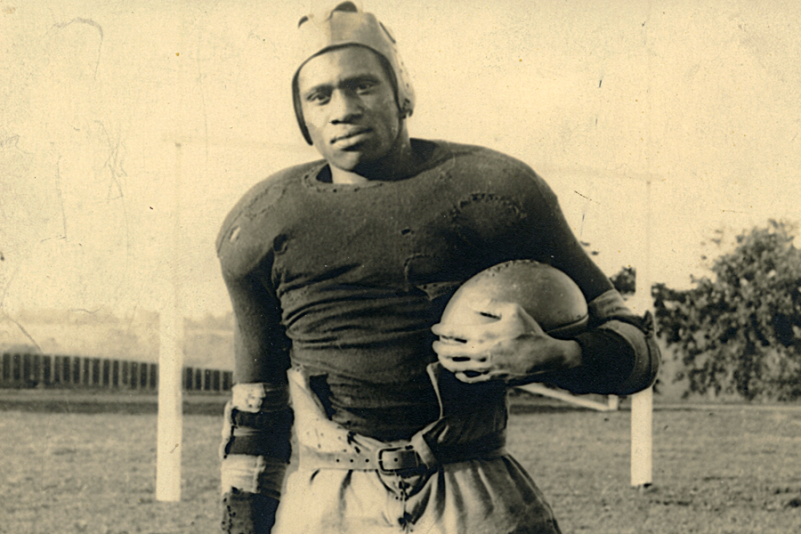
Robeson, a legendary athlete, scholar, actor and singer, was persecuted by the US for his political activism.
Remembering Paul Robeson
On the 127th Anniversary of his Birth
Bill Berkowitz / BuzzFlash and Daily Kos
(April 9, 2023) — To borrow from Walt Whitman’s 1855 poem, Paul Robeson contained multitudes. Before Jackie Robinson, Bill Russell, Kareem Abdul Jabbar, Harry Belafonte, Muhammad Ali, LeBron James, Colin Kaepernick, Megan Rapinoe, Billie Jean King, there was Paul Robeson.
Robeson believed it was his duty, as a famous person, to speak out against injustice and for peace. One of America’s earliest and greatest athletes of color (along with the boxer Jack Johnson, and Jim Thorpe), Robeson was harshly punished when he spoke out against racism, and in support of world peace.
According to several accounts, Robeson believed that the struggle against fascism during the Spanish Civil War was a turning point in his life and transformed him into a political activist. Prior to the Second World War, he was living in London and was included in the Sonderfahndungsliste G.B as a target for arrest in the event Germany occupied Britain. Shortly after World War II began, he moved back to the US At that point, with an uptick in his political activism, he became a target of the FBI.
In 1949, as the Cold War against the Soviet Union was beginning to heat up, Robeson travelled to France and gave a speech about the living conditions of black people in the US, and his hopes for avoiding World War III. His remarks were misquoted, and members of the House Un-American Activities Committee (HUAC), and some in the press labeled him anti-American. One HUAC member called him “the Kremlin’s voice of America.”
As the Smithsonian Magazine’s Gilbert King wrote in September 2011, “Not even the leading black spokesmen of the day, whose causes Robeson had championed at great personal cost, felt safe enough to stand by the man dubbed as the ‘Black Stalin’ during the Red Scare of the late 1940s and ’50s.”
The US government revoked his passport and dozens of planned concerts across the country were cancelled.
Robeson was born on April 9, 1898, in Princeton, New Jersey, the son of a runaway slave, William Drew Robeson. In 1915, he was one of the first three African Americans to be admitted to Rutgers University. He became an All-American football player — winning numerous letters in other sports as well — was a member of Phi Beta Kappa, and served as his class valedictorian. He played professional football in the American Professional Football League; with Hammond in 1920, Akron in 1921, and Milwaukee in 1922. (More on his athletic career can be found at The Vault and the National Football Foundation.)

As Smithsonian Magazine’s King pointed out. Robeson “worked his way through Columbia Law School while playing professional football. Although he had a brief stint at a New York law firm after graduating, Robeson’s voice brought him public acclaim.
Soon he was starring on Broadway, as well as on the greatest stages around the world, in plays such as Shakespeare’s Othello and the Gershwin brothers’ Porgy and Bess. His resonant bass-baritone voice made him a recording star as well, and by the 1930s, he became a box office sensation in the film Show Boat with his stirring rendition of “Ol Man River.”
King described the controversy in 1949 that led to Robeson being persecuted by the US government:
Robeson traveled to France to attend the Soviet Union-sponsored Paris Peace Conference. After singing “Joe Hill,” the famous ballad about a Swedish-born union activist falsely accused and convicted of murder and executed in Utah in 1915, Robeson [spoke] … about the lives of black people in the United States. Robeson’s main point was that World War III was not inevitable, as many Americans did not want war with the Soviet Union.
Before he took the stage, however, his speech had somehow already been transcribed and dispatched back to the United States by the Associated Press. By the following day, editorialists and politicians had branded Robeson a communist traitor for insinuating that black Americans would not fight in a war against the Soviet Union. Historians would later discover that Robeson had been misquoted, but the damage had been almost instantly done. And because he was out of the country, the singer was unaware of the firestorm brewing back home over the speech.
It was the beginning of the end for Robeson, who would soon be declared “the Kremlin’s voice of America” by a witness at hearings by the House Un-American Activities Committee (HUAC). …Robeson’s passport was soon revoked, and 85 of his planned concerts in the United States were canceled. Some in the press were calling for his execution.
Robeson was one of America’s original renaissance men: scholar, athlete, stage and screen star, singer, civil and human rights activist, newspaper publisher, and a man respected worldwide by liberation movements and freedom fighters combating imperialism and colonialism.
He sang songs promoting world peace and human rights in 25 languages, including Russian, Chinese and several African languages. There is no clear evidence that Robeson was ever a member of the Communist Party, although he unabashedly associated himself with communist causes from Africa to the Soviet Union.
There hasn’t, to my knowledge, been a biopic about Robeson, and you rarely hear his name mentioned when the names of social activist athletes are invoked. While it is important to recognize the contributions to civil rights and social activism made by Russell, Jim Brown, Ali, Jabbar, Kaepernick, and many more athletes currently active, Robeson’s name has been wiped from history.
Interestingly, on a recent edition of ESPN’s “Highly Questionable,” panelist Domonique Foxwoth did mention Robeson’s name.
Robeson was always available for workers struggling for their rights. In 1942, he sang to workers at the racially integrated Moore shipyards in Oakland. In a 1997 San Francisco Chronicle story, classical pianist William Duncan Allen told of accompanying Robeson at several concerts in the Bay Area in 1957.
In the first quarter of 1971, Freedomways: A Quarterly Review of the Freedom Movement, published a Special Issue devoted to Robeson. Among the contributors were Shirley Graham Du Bois, author, composer, lecturer, and teacher and widow of Dr. W.E.B. Du Bois; Alice Childress, author, playwright and actress; Lena Horne, Black singer and actress; Dick Gregory, athlete, comedian, and civil rights activist; Nikki Giovanni, poet; and Gwendolyn Brooks, one of America’s greatest poets.
In an Editorial titled “Paul Robeson: The Great Forerunner,” Freedomways editors wrote:
As the racist military adventure in Southeast Asia spreads and the casualties mount once again pushing the world dangerously close to a nuclear third world war, we are reminded that it was Paul Robeson, as an internationally recognized champion of world peace among the nations, whose voice was raised to “bring the troops home from Korea” two decades ago.
As our Movement gathers strength to turn back Nixon-Agnew repression, we are reminded that Robeson was an early target of McCarthyism and a symbol of the figh- back spirit, the right to hold “controversial” opinions, during the Eisenhower-Nixon years.”
Paul Robeson died in Philadelphia on January 23, 1976. He had performed in eleven movies, including his most famous role in Eugene O’Neill’s The Emperor Jones. Between 1925 and 1961, Robeson recorded and released some 276 distinct songs, many in foreign languages. After his passport was revoked, Robeson did manage to perform at least two telephone concerts; one in London and one in Wales, however, during the height of the Cold War, it was difficult to hear Robeson sing on commercial radio in the US, buy his music or see his films.
His passport was ultimately restored, as a result of the 1958 United States Supreme Court decision Kent v. Dulles, and he embarked on a world tour in 1959. In 1963, after several serious bouts with his health, he returned to the US, where he lived the remainder of his life in seclusion.
According to Wikipedia, since his death, Robeson has received many awards: His efforts to end Apartheid in South Africa were posthumously rewarded in 1978 by the United Nations General Assembly. Paul Robeson: Tribute to an Artist won an Academy Award for best short documentary in 1980.
In 1995, he was named to the College Football Hall of Fame. In the centenary of his birth, which was commemorated around the world, he was awarded a Lifetime Achievement Grammy Award, as well as a star on the Hollywood Walk of Fame. Robeson is also a member of the American Theater Hall of Fame.
Unable to appear at a Carnegie Hall 75th birthday tribute, Robeson sent a message that said: “Though I have not been able to be active for several years, I want you to know that I am the same Paul, dedicated as ever to the worldwide cause of humanity for freedom, peace and brotherhood.”
This article originally appeared in BuzzFlash in April 2021
Posted in accordance with Title 17, Section 107, US Code, for noncommercial, educational purposes.